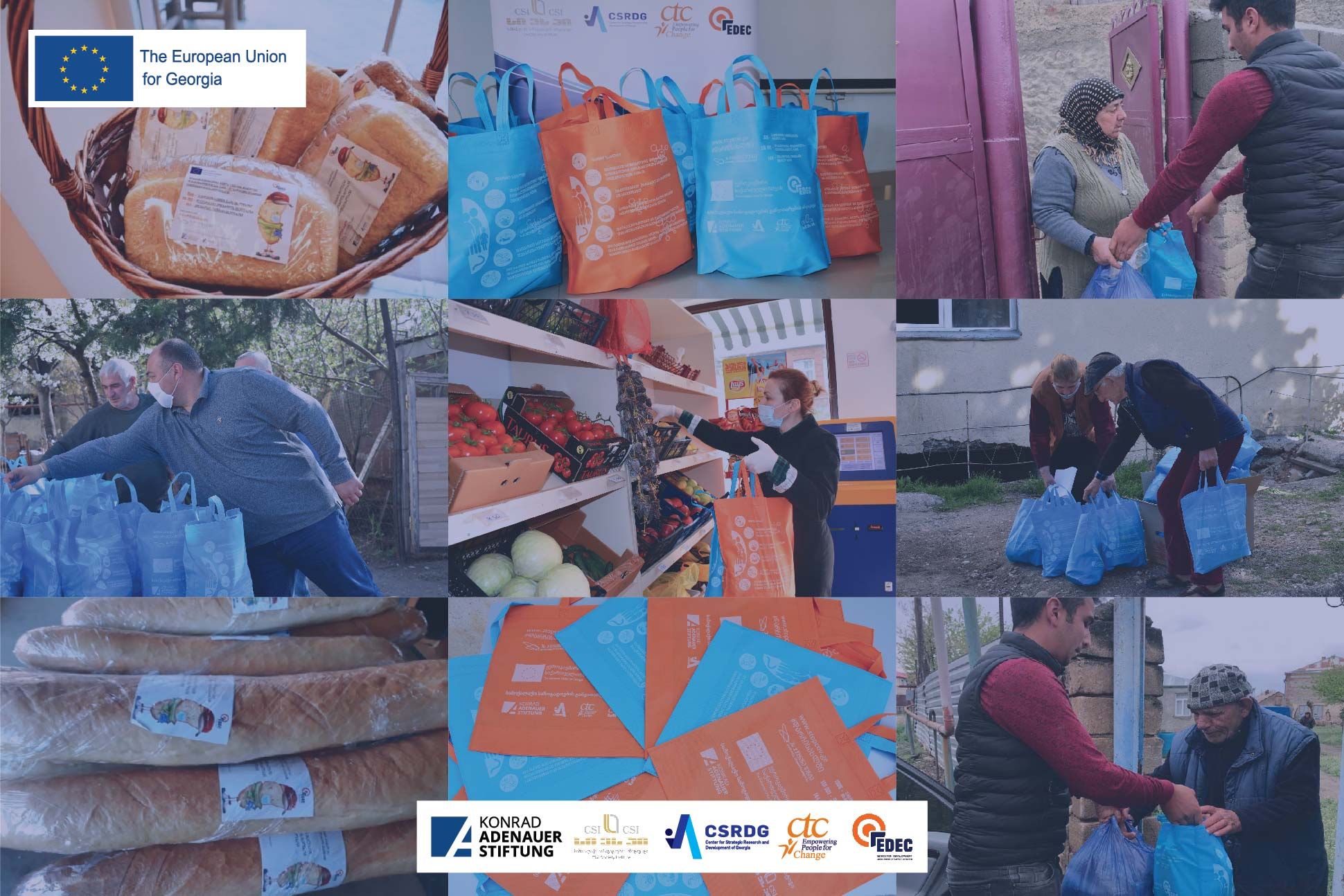
EU supported project “Georgian Civil Society Sustainability Initiative” implemented innovative ways of delivering information to prevent further spread of COVID-19
Jemal Gvelukashvili, 81, lives in the village of Giorgitsminda in Sagarejo district: “Leaving home is a big problem. The information and the assistance are both good. Many thanks to the European Union and Sagarejo City Hall for their help.”
Bread labelled with special COVID-19 information stickers has been sold in the shops of Kutaisi already for two weeks. Seven bakeries in Western Georgia have joined the information campaign and supplied some 173,760 loaves of bread with the information stickers to local shops. Furthermore, the campaign also distributed 22,500 reusable grocery bags throughout ten regions of Georgia. The bags have description of COVID-19 preventive measures as well as contact details of the Emergency Response Center 112, the Public Safety Management Centre, the Ministry of Health, the National Center for Disease Control and the Government’s unified hotline, printed on them in the Georgian, Azerbaijani and Armenian languages.
The information campaign was planned by the Education Development and Employment Center (EDEC) with the financial support of the European Union (EU) and the Konrad Adenauer Stiftung (KAS).
According to Lika Kiladze, Chair of the EDEC Board and the Project Manager, they joined the campaign to curb the spread of the pandemic since its first days and soon drafted a plan.
“It was a new challenge for us, something we had never experienced before, and we were not sure about the needs. We started online meetings with representatives of the regional hub and the communication made it clear that people needed reliable information. Some people with fever had no idea which procedures to follow, how to act or where to call, so they thought they would better keep it secret to avoid hospitalization. We chose bread because almost all families buy it; besides, we were pressed for time,” Ms. Kiladze said.
Alongside with the EDEC, the campaign involves the Georgian Civil Society Sustainability Initiative (CSSIGE). The project, uniting ten regional hubs across Georgia, started in 2017 with the purpose of promoting civil society development, and has implemented over 110 activities during in three years since then.
On March 22, one of the first COVID-19 clusters in Georgia with up to 80 contacts was identified in the region of Marneuli, causing mass media highlights about local Azerbaijanis having no access to COVID-19 information in their native language. The region of Kakheti also was considered within the risk zone, as local Azerbaijani community had close relations with people in Marneuli. It became critical at that time to provide updates about the virus.
Maia Mamulashvili, Director of Media Center Kakheti and a representative of the CSSIGE hub in the region, was among the first to distribute information bags among the Azerbaijani community in Kakheti.
“As we joined the large-scale project, we started analyzing what we needed in order to combat the spread of COVID-19 effectively. Our hub people continuously distribute COVID-19 information among the population in rural areas, where television and the Internet are not widely available. This is obvious from the many fines imposed during the state of emergency,” Ms. Mamulashvili said.
Regional municipalities and volunteers have joined the campaign together with the hubs. They use the information bags to deliver groceries to socially vulnerable families.
“We visited villages and distributed the bags among locals. We also handed the information bags to local shops, and people would start reading them right away, as there had been no COVID-19 information in the Armenian language available there,” said Giorgi Andguladze, a representative of the CSSIGE hub in Samtskhe-Javakheti, a region that has 100,000 ethnic Armenians in the total population of 230,000.
Television and the Internet are not generally available information delivery channels for local ethnic minorities, he said, adding that locals mainly watch Russian channels that often-spread misinformation.
A total of 6,800 information bags were distributed in Samtskhe-Javakheti within the frames of the campaign.
The COVID-19 pandemic has changed the global agenda. The first confirmed case was registered in Georgia on February 26, with 566 people infected in the following months, according to the latest data. Two months ago, the government declared the state of emergency; and even longer the country has been combatting the virus that still remains largely unexplored.
The Georgian Civil Society Sustainability Initiative is implemented by the Konrad Adenauer Stiftung (KAS) in cooperation with the Civil Society Institute (CSI), the Center for Training and Consultancy (CTC), the Center for Strategic Research and Development of Georgia (CSRDG) and the Education Development and Employment Center (EDEC). The project is funded by the European Union (EU) and co-funded by the Konrad Adenauer Stiftung (KAS).